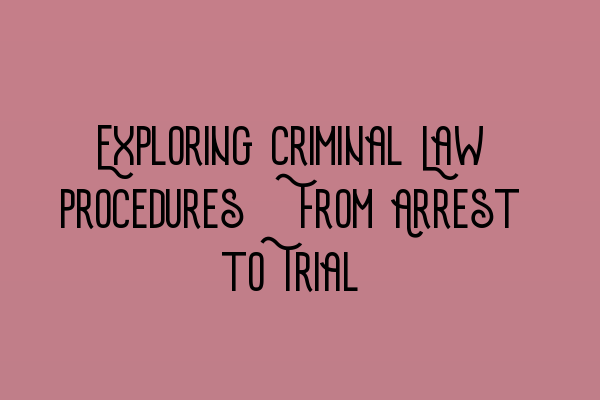Exploring Criminal Law Procedures: From Arrest to Trial
Welcome to SQE Criminal Law & Practice Law UK! In this article, we will delve into the intricacies of criminal law procedures, taking you through the journey from arrest to trial. Understanding these procedures is fundamental for aspiring solicitors and legal professionals alike.
1. The Arrest
When a crime is committed, the police have the authority to make an arrest if they have reasonable grounds to believe that the person is involved. This marks the beginning of the criminal justice process. The arrested person is then taken into custody, and their rights must be upheld throughout the entire procedure. To learn more about this stage, check out our article.
2. Police Interview and Investigation
Once in custody, the police may conduct interviews and investigations to gather evidence and build a case. It is crucial for solicitors to understand the police interview process and how to advise their clients during this stage. Want to practice your knowledge? Try our quizzes to test your understanding.
3. Charging Decision
After the investigation, the police will make a charging decision. They will decide whether there is enough evidence to proceed with formal charges against the suspect. This decision is based on the evidential and public interest tests. Solicitors need to be well-versed in these tests to provide the best advice to their clients.
4. Bail Application
If the suspect is charged, they may have the opportunity to apply for bail. Bail allows the accused to be released from custody while awaiting trial. Solicitors play a crucial role in preparing bail applications, ensuring that their clients’ rights are protected. To learn more about preparing for bail applications, check out our .
5. Pretrial Proceedings
Before the trial, various pretrial proceedings take place. This includes case management hearings, disclosure of evidence, legal arguments, and potential plea negotiations. Solicitors must navigate these proceedings effectively to build a strong case for their clients. For comprehensive preparation, explore our .
6. The Trial
The trial is the heart of the criminal justice process. It is during the trial that the prosecution presents evidence, witnesses testify, and the defense challenges the evidence. Solicitors must possess strong advocacy skills and a deep understanding of the law to represent their clients effectively. To stay updated on upcoming trial dates, refer to the page.
By now, you should have a clearer understanding of the criminal law procedures from arrest to trial. Remember that mastering these procedures is crucial for success in the legal profession. Stay tuned for more informative articles from SQE Criminal Law & Practice Law UK!
